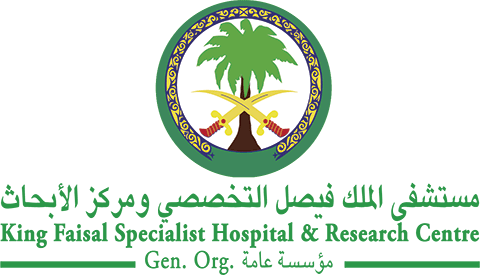Authors
Othman M. Solaiman, Department of Critical Care Medicine, King Faisal Specialist Hospital and Research Centre, Riyadh, Saudi Arabia0Follow
Tusneem Elhassan, Oncology Centre, King Faisal Specialist Hospital and Research Centre, Riyadh, Saudi Arabia
Riad El Fakih, Hematology, Stem Cell Transplantation and Cellular Therapy, Oncology Centre, King Faisal Specialist Hospital and Research Centre, Riyadh, Saudi Arabia
Abdul Mannan, Betsi Cadwaladr University 32.Hospital, Ysbyty Gwynedd, Penrhosgarnedd, Bangor, Gwynedd, Wales, UK
Zainab Alduhailib, Department of Critical Care Medicine, King Faisal Specialist Hospital and Research Centre, Riyadh, Saudi Arabia
Ashwaq A. Mahdali, Department of Critical Care Medicine, King Faisal Specialist Hospital and Research Centre, Riyadh, Saudi Arabia
Hazzaa Alzahrani, Hematology, Stem Cell Transplantation and Cellular Therapy, Oncology Centre, King Faisal Specialist Hospital and Research Centre, Riyadh, Saudi Arabia
Mouhamad Jamil, Department of Critical Care Medicine, King Faisal Specialist Hospital and Research Centre, Riyadh, Saudi Arabia
Naeem Chaudhri, Hematology, Stem Cell Transplantation and Cellular Therapy, Oncology Centre, King Faisal Specialist Hospital and Research Centre, Riyadh, Saudi Arabia
Alyaa Elhazmi, Interhealth Hospital, King Saud University, Riyadh, Saudi Arabia
Mohammad Kolko, Intensive Care Unit, Security Forces Hospital Program, Makkah, Saudi Arabia
Fahad Z. Al-Sharif, Hematology, Stem Cell Transplantation and Cellular Therapy, Oncology Centre, King Faisal Specialist Hospital and Research Centre, Riyadh, Saudi Arabia
Abdullah Alrbiaan, Department of Critical Care Medicine, King Faisal Specialist Hospital and Research Centre, Riyadh, Saudi Arabia
Mohammed Shaban, Department of Critical Care Medicine, King Faisal Specialist Hospital and Research Centre, Riyadh, Saudi Arabia
Marwan Shaheen, Hematology, Stem Cell Transplantation and Cellular Therapy, Oncology Centre, King Faisal Specialist Hospital and Research Centre, Riyadh, Saudi Arabia
Nawal Salahuddin, Department of Pulmonary and Critical Care Medicine, National Institute of Cardiovascular Diseases, Karachi, Pakistan
Feras A. Alfraih, Hematology, Stem Cell Transplantation and Cellular Therapy, Oncology Centre, King Faisal Specialist Hospital and Research Centre, Riyadh, Saudi Arabia
Ashraf S. Altarifi, Department of Critical Care Medicine, King Faisal Specialist Hospital and Research Centre, Riyadh, Saudi Arabia
Mona Hassanein, Kuwait Cancer Control Center, Kuwait City, Kuwait
Sulaiman Hosaini, Department of Critical Care Medicine, King Faisal Specialist Hospital and Research Centre, Riyadh, Saudi Arabia
Noura Alhashim, Hematology, Stem Cell Transplantation and Cellular Therapy, Oncology Centre, King Faisal Specialist Hospital and Research Centre, Riyadh, Saudi Arabia
Alaa Abdelhafiz Mohamed, Department of Critical Care Medicine, King Faisal Specialist Hospital and Research Centre, Riyadh, Saudi Arabia
Amr Hanbali, Hematology, Stem Cell Transplantation and Cellular Therapy, Oncology Centre, King Faisal Specialist Hospital and Research Centre, Riyadh, Saudi Arabia
Ali Hussein Aljanoubi, Critical Care Services Administration, Adult Critical Care Department, King Fahad Medical City, Riyadh, Saudi Arabia
Nadia R. Al-Obaidi, King Abdulaziz Hospital, Jeddah, Saudi Arabia
Walid Rasheed, Hematology, Stem Cell Transplantation and Cellular Therapy, Oncology Centre, King Faisal Specialist Hospital and Research Centre, Riyadh, Saudi Arabia
Khalid Maghrabi, College of Medicine, Alfaisal University, Riyadh, Saudi Arabia
Fahad Almohareb, Hematology, Stem Cell Transplantation and Cellular Therapy, Oncology Centre, King Faisal Specialist Hospital and Research Centre, Riyadh, Saudi Arabia
Ayman Soubani, Harper University Hospital, Wayne State University School of Medicine, USA
Mahmoud Aljurf, Hematology, Stem Cell Transplantation and Cellular Therapy, Oncology Centre, King Faisal Specialist Hospital and Research Centre, Riyadh, Saudi Arabia
Syed Osman Ahmed, Hematology, Stem Cell Transplantation and Cellular Therapy, Oncology Centre, King Faisal Specialist Hospital and Research Centre, Riyadh, Saudi Arabia
Abstract
Objective: Prognostic factors reliably predicting outcomes for critically ill adolescent and young adult (AYA) patients undergoing allogeneic hematopoietic cell transplantation (allo-HSCT) are lacking. We assessed transplant and intensive care unit (ICU)-related factors impacting patient outcomes. Design: Retrospective review Setting: Tertiary care Centre, during the period of 2003-2013 Patients: AYA patients who underwent allo-HSCT and required ICU admission. Interventions: This was a non-interventional study. Only outcomes after first allo-HSCT and index ICU admissions were analyzed. Disease-, transplant-, and ICU-related variables were analyzed to identify risk factors predictive of survival. Measurements and Main Results: Overall, 152 patients were included (males, 60.5%); median age at transplantation was 24 years (IQR 18-32.5); median age at admission to the ICU was 25.8 years (IQR 19-34). Eighty-four percent underwent transplantation for a hematological malignancy; 129 (85%) received myeloablative conditioning. Seventy-one percent of ICU admissions occurred within the first year after allo-HSCT. ICU admission was primarily due to respiratory failure (47.3%) and sepsis (43.4%). One hundred three patients (68%) died within 28 days of ICU admission. The 1-year and 5-year overall survival (OS) rates were 19% and 17%, respectively. Main causes for ICU-related death were refractory septic shock with multiorgan failure (n=49, 32%) and acute respiratory distress syndrome (ARDS) (n=39, 26%). Univariate analysis showed that ICU mortality was associated with an Acute Physiology and Chronic Health Evaluation (APACHE) II score > 20, a sequential organ failure assessment (SOFA score) > 12, a high lactate level, anemia, thrombocytopenia, leukopenia, hyperbilirubinemia, a high international normalized ratio (INR) and acute GVHD. Multivariate analysis identified thrombocytopenia, high INR, and acute GVHD as independent predictors of mortality. Conclusions: In AYA allo-HSCT patients admitted to the ICU, mortality remains high. Higher SOFA and APACHE scores, need for organ support, thrombocytopenia, coagulopathy, and acute GVHD predict poor outcomes.
Recommended Citation
Solaiman, Othman M.; Elhassan, Tusneem; El Fakih, Riad; Mannan, Abdul; Alduhailib, Zainab; Mahdali, Ashwaq A.; Alzahrani, Hazzaa; Jamil, Mouhamad; Chaudhri, Naeem; Elhazmi, Alyaa; Kolko, Mohammad; Al-Sharif, Fahad Z.; Alrbiaan, Abdullah; Shaban, Mohammed; Shaheen, Marwan; Salahuddin, Nawal; Alfraih, Feras A.; Altarifi, Ashraf S.; Hassanein, Mona; Hosaini, Sulaiman; Alhashim, Noura; Mohamed, Alaa Abdelhafiz; Hanbali, Amr; Aljanoubi, Ali Hussein; Al-Obaidi, Nadia R.; Rasheed, Walid; Maghrabi, Khalid; Almohareb, Fahad; Soubani, Ayman; Aljurf, Mahmoud; and Ahmed, Syed Osman
(2024)
"Outcomes and Long-Term Survival of Adolescent and Young Adult Patients Admitted to the Intensive Care Unit Following Allogeneic Hematopoietic Stem Cell Transplantation: A Single-Centre Experience of 152 Patients,"
Hematology/Oncology and Stem Cell Therapy: Vol. 17
:
Iss.
2
, Article 3.
Available at: https://doi.org/10.56875/2589-0646.1114


